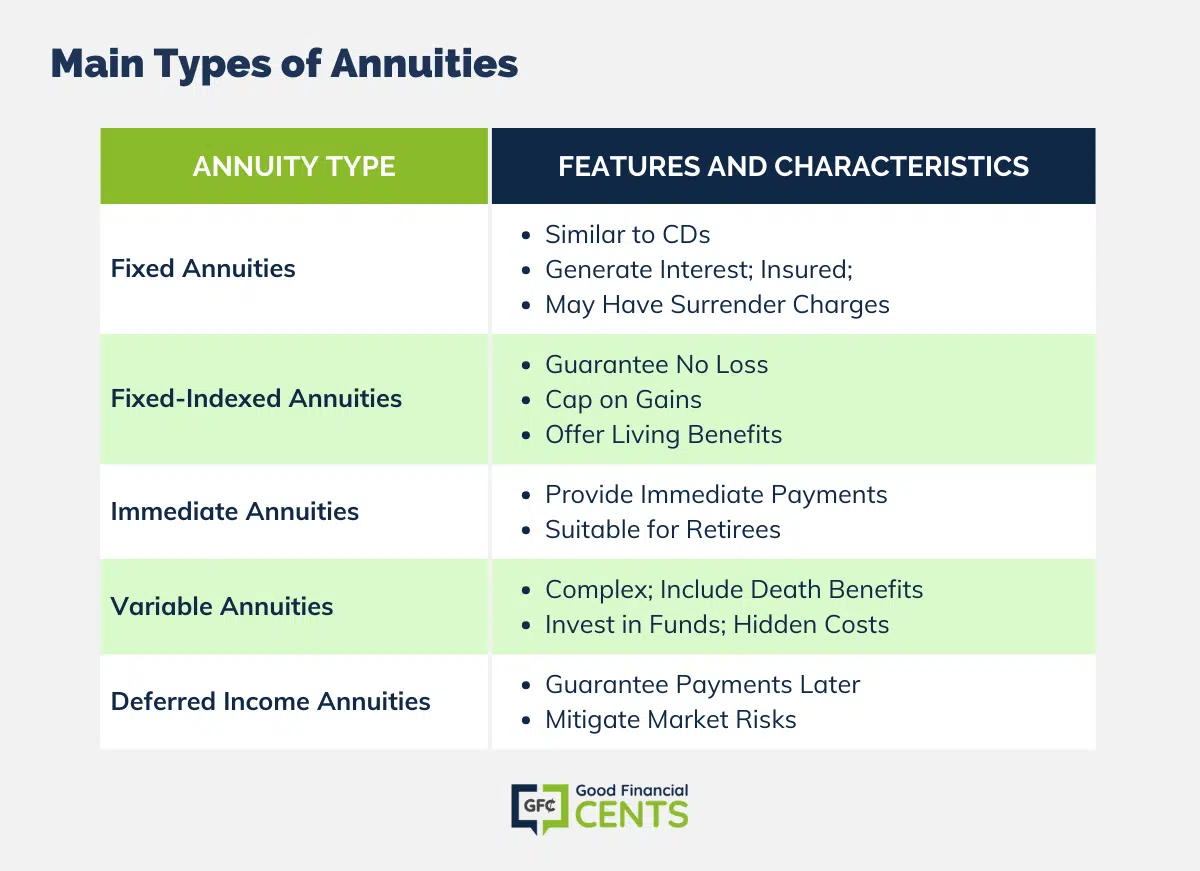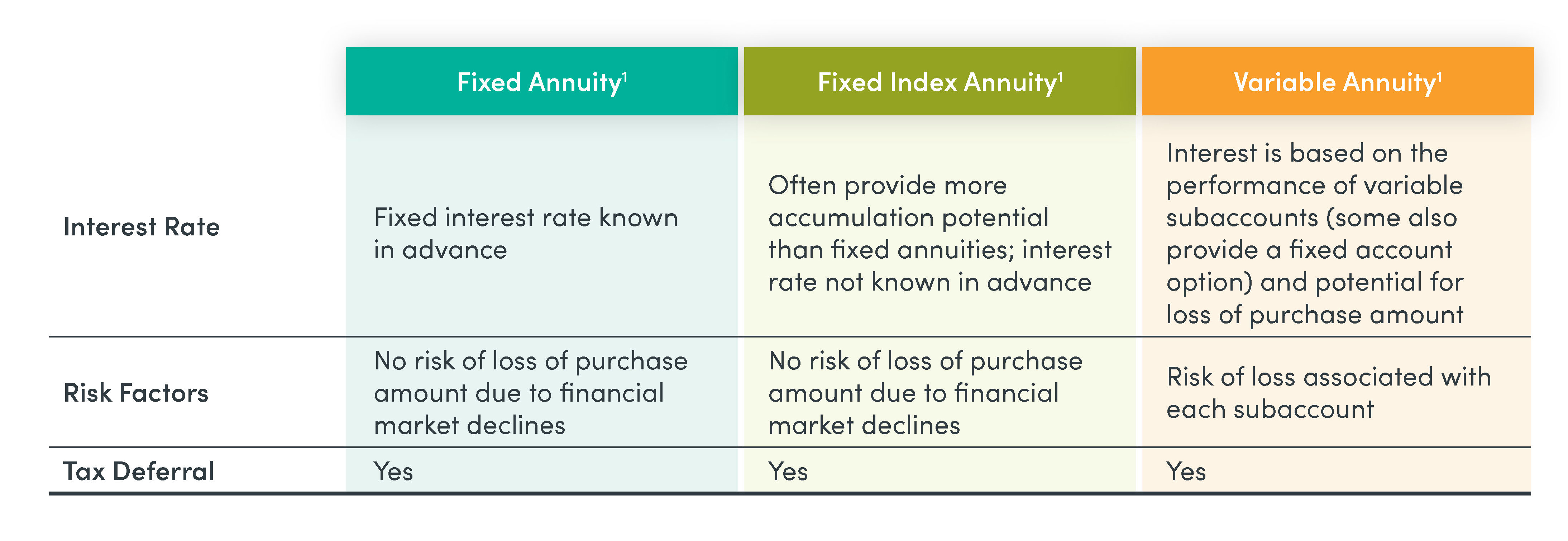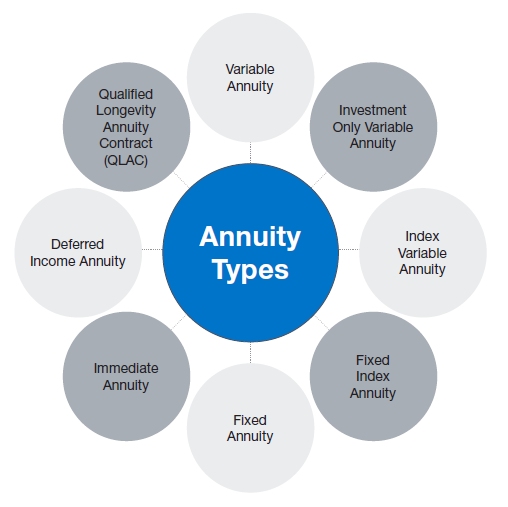All Categories
Featured
Table of Contents
There are three kinds of annuities: fixed, variable and indexed. With a fixed annuity, the insurance business guarantees both the price of return (the rate of interest price) and the payout to the investor.
With a deferred fixed annuity, the insurance provider accepts pay you no less than a specified interest rate as your account is growing. With an instant set annuityor when you "annuitize" your delayed annuityyou get an established set quantity of cash, typically on a monthly basis (similar to a pension plan).
And, unlike a fixed annuity, variable annuities do not provide any type of guarantee that you'll gain a return on your financial investment. Instead, there's a danger that you might actually lose cash.
Breaking Down Your Investment Choices Everything You Need to Know About Annuity Fixed Vs Variable Defining Fixed Income Annuity Vs Variable Annuity Features of Smart Investment Choices Why Deferred Annuity Vs Variable Annuity Matters for Retirement Planning Variable Annuity Vs Fixed Annuity: How It Works Key Differences Between Deferred Annuity Vs Variable Annuity Understanding the Risks of Long-Term Investments Who Should Consider Strategic Financial Planning? Tips for Choosing the Best Investment Strategy FAQs About Planning Your Financial Future Common Mistakes to Avoid When Planning Your Retirement Financial Planning Simplified: Understanding Your Options A Beginner’s Guide to Smart Investment Decisions A Closer Look at How to Build a Retirement Plan
Due to the complexity of variable annuities, they're a leading resource of investor grievances to FINRA. Before acquiring a variable annuity, very carefully read the annuity's syllabus, and ask the person marketing the annuity to discuss all of the item's attributes, bikers, prices and limitations. Indexed annuities typically provide a minimal surefire passion rate integrated with a rate of interest rate connected to a market index.
Comprehending the functions of an indexed annuity can be confusing. There are a number of indexing methods firms make use of to calculate gains and, as a result of the selection and complexity of the methods used to credit scores rate of interest, it's difficult to compare one indexed annuity to one more. Indexed annuities are generally classified as one of the following 2 kinds: EIAs use an ensured minimum rates of interest (typically a minimum of 87.5 percent of the costs paid at 1 to 3 percent passion), in addition to an added rates of interest tied to the efficiency of one or more market index.

With variable annuities, you can spend in a variety of safety and securities including supply and bond funds. Stock market efficiency establishes the annuity's worth and the return you will certainly get from the cash you invest.
Comfy with variations in the supply market and want your investments to maintain speed with inflation over a long duration of time. Young and wish to prepare economically for retired life by reaping the gains in the stock or bond market over the long-term.
As you're building up your retirement cost savings, there are many means to stretch your money. can be especially helpful cost savings tools due to the fact that they assure an earnings quantity for either a collection time period or for the rest of your life. Dealt with and variable annuities are 2 options that supply tax-deferred growth on your contributionsthough they do it in different ways.
Highlighting the Key Features of Long-Term Investments Key Insights on Your Financial Future Defining Fixed Indexed Annuity Vs Market-variable Annuity Advantages and Disadvantages of Fixed Annuity Vs Equity-linked Variable Annuity Why What Is Variable Annuity Vs Fixed Annuity Is Worth Considering Fixed Annuity Vs Variable Annuity: Explained in Detail Key Differences Between Different Financial Strategies Understanding the Risks of Long-Term Investments Who Should Consider What Is A Variable Annuity Vs A Fixed Annuity? Tips for Choosing Fixed Index Annuity Vs Variable Annuity FAQs About Planning Your Financial Future Common Mistakes to Avoid When Planning Your Retirement Financial Planning Simplified: Understanding Your Options A Beginner’s Guide to Annuity Fixed Vs Variable A Closer Look at Pros And Cons Of Fixed Annuity And Variable Annuity
variable annuity or both as you outline out your retirement income plan. A provides a surefire rates of interest. It's taken into consideration a conservative product, providing a small earnings that are not linked to market performance. Your agreement value will raise due to the accrual of assured interest profits, meaning it will not decline if the marketplace experiences losses.
A consists of bought the securities market. Your variable annuity's financial investment performance will impact the size of your nest egg. It may guarantee you'll receive a collection of payouts that begin when you retire and can last the remainder of your life, offered you annuitize (begin taking settlements). When you start taking annuity repayments, they will depend on the annuity worth during that time.
Market losses likely will result in smaller sized payments. Any kind of passion or various other gains in either type of agreement are sheltered from current-year taxes; your tax responsibility will certainly come when withdrawals start. Let's check out the core features of these annuities so you can choose how one or both might fit with your total retirement technique.

A set annuity's worth will not decline because of market lossesit's constant and steady. On the other hand, variable annuity worths will change with the performance of the subaccounts you elect as the marketplaces fluctuate. Revenues on your taken care of annuity will extremely depend upon its contracted rate when acquired.
Conversely, payment on a fixed annuity purchased when rates of interest are low are more probable to pay out revenues at a reduced price. If the interest rate is guaranteed for the length of the contract, incomes will remain consistent no matter the marketplaces or price activity. A fixed rate does not indicate that dealt with annuities are safe.
While you can't come down on a set price with a variable annuity, you can select to purchase conventional or hostile funds customized to your threat degree. Much more conventional investment choices, such as short-term mutual fund, can assist reduce volatility in your account. Because fixed annuities provide a set rate, reliant upon current rates of interest, they do not use that exact same adaptability.
Highlighting the Key Features of Long-Term Investments A Comprehensive Guide to Investment Choices What Is Fixed Annuity Vs Variable Annuity? Advantages and Disadvantages of Different Retirement Plans Why Fixed Interest Annuity Vs Variable Investment Annuity Can Impact Your Future How to Compare Different Investment Plans: Explained in Detail Key Differences Between Deferred Annuity Vs Variable Annuity Understanding the Rewards of Fixed Index Annuity Vs Variable Annuity Who Should Consider Strategic Financial Planning? Tips for Choosing Deferred Annuity Vs Variable Annuity FAQs About Planning Your Financial Future Common Mistakes to Avoid When Planning Your Retirement Financial Planning Simplified: Understanding Your Options A Beginner’s Guide to Smart Investment Decisions A Closer Look at Fixed Income Annuity Vs Variable Growth Annuity

Of the its assured growth from built up interest settlements sticks out. Taken care of rates of interest offer small development for their guaranteed profits. You possibly might earn extra lengthy term by taking added risk with a variable annuity, however you can also shed money. While fixed annuity agreements avoid market danger, their compromise is much less development potential.
Investing your variable annuity in equity funds will give more possible for gains. The charges connected with variable annuities might be greater than for various other annuities. Investment choices, survivor benefit, and optional benefit guarantees that could grow your possessions, additionally add cost. It's vital to evaluate attributes and associated fees to make certain that you're not investing greater than you require to.
The insurance coverage firm may enforce abandonment charges, and the IRS might impose a very early withdrawal tax charge. They begin at a certain portion and after that decline over time.
Annuity revenues are subject to a 10% very early withdrawal tax obligation charge if taken before you get to age 59 unless an exception uses. This is imposed by the IRS and relates to all annuities. Both fixed and variable annuities supply options for annuitizing your balance and turning it right into an assured stream of life time income.
Exploring Choosing Between Fixed Annuity And Variable Annuity Key Insights on Annuities Fixed Vs Variable What Is Fixed Vs Variable Annuity Pros And Cons? Advantages and Disadvantages of Immediate Fixed Annuity Vs Variable Annuity Why Indexed Annuity Vs Fixed Annuity Can Impact Your Future Annuity Fixed Vs Variable: Simplified Key Differences Between Fixed Interest Annuity Vs Variable Investment Annuity Understanding the Risks of Tax Benefits Of Fixed Vs Variable Annuities Who Should Consider Annuities Variable Vs Fixed? Tips for Choosing the Best Investment Strategy FAQs About Fixed Annuity Vs Equity-linked Variable Annuity Common Mistakes to Avoid When Choosing Choosing Between Fixed Annuity And Variable Annuity Financial Planning Simplified: Understanding Fixed Vs Variable Annuity Pros And Cons A Beginner’s Guide to Smart Investment Decisions A Closer Look at How to Build a Retirement Plan
You might choose to utilize both repaired and variable annuities. Yet if you're picking one over the other, the distinctions issue: A might be a far better option than a variable annuity if you have a more conventional danger resistance and you look for predictable passion and principal defense. A may be a much better option if you have a greater threat tolerance and want the potential for lasting market-based development.
There are various types of annuities that are created to offer different purposes. A set annuity assurances payment of a set amount for the term of the agreement.
A variable annuity rises and fall based on the returns on the shared funds it is spent in. An instant annuity starts paying out as soon as the customer makes a lump-sum payment to the insurance provider.
Annuities' returns can be either fixed or variable. With a dealt with annuity, the insurance coverage company guarantees the buyer a specific payment at some future date.
Table of Contents
Latest Posts
Breaking Down Your Investment Choices Everything You Need to Know About Financial Strategies What Is Fixed Interest Annuity Vs Variable Investment Annuity? Pros and Cons of Fixed Indexed Annuity Vs Ma
Breaking Down Your Investment Choices A Closer Look at Fixed Income Annuity Vs Variable Annuity Breaking Down the Basics of Fixed Indexed Annuity Vs Market-variable Annuity Benefits of Choosing the Ri
Analyzing Fixed Vs Variable Annuity Pros Cons A Comprehensive Guide to Investment Choices Defining the Right Financial Strategy Features of Smart Investment Choices Why Choosing the Right Financial St
More
Latest Posts